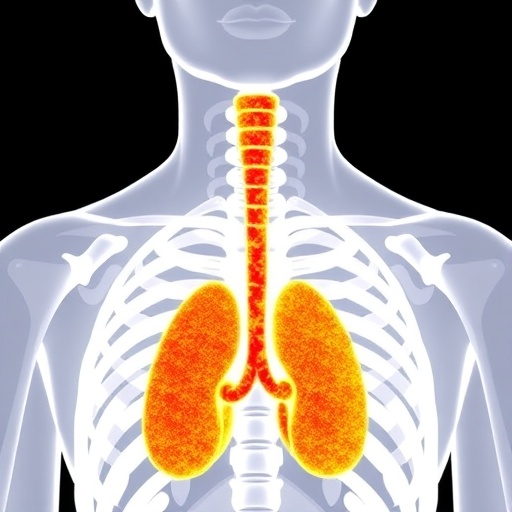
A groundbreaking multi-institutional study has unveiled a promising approach to improving the management of bladder cancer by utilizing urine-based tumor DNA (utDNA) analysis. Published in the prestigious journal European Urology, the research highlights how quantifying utDNA can predict the risk of recurrence in patients undergoing immunotherapy, specifically those treated with atezolizumab. This advance heralds a new era in personalized bladder cancer care, offering a potentially transformative tool for clinicians seeking to optimize treatment strategies and enhance patient outcomes.
Bladder cancer represents a significant public health challenge in the United States, ranking as the sixth most common malignancy with over 83,000 new diagnoses annually. Notably, the majority of these cases—approximately 75%—are non–muscle-invasive bladder cancer (NMIBC), a category characterized by the disease being confined to the bladder’s inner lining without invading the muscular layer. Early stages of the disease are often managed with intravesical therapies like Bacillus Calmette-Guérin (BCG), an immunotherapeutic agent designed to stimulate the immune system to target cancer cells.
The study focused on a particularly difficult clinical scenario: patients with high-risk NMIBC that were classified as BCG-unresponsive, a condition that portends a higher likelihood of disease progression and recurrence. Treatment alternatives for these patients have been limited, typically involving radical cystectomy, an extensive surgery that removes the bladder and can adversely impact quality of life. Consequently, identifying biomarkers to stratify patient risk and tailor treatments has been a pivotal unmet need in uro-oncology.
.adsslot_e0AacLfvz1{ width:728px !important; height:90px !important; }
@media (max-width:1199px) { .adsslot_e0AacLfvz1{ width:468px !important; height:60px !important; } }
@media (max-width:767px) { .adsslot_e0AacLfvz1{ width:320px !important; height:50px !important; } }
ADVERTISEMENT
This research leveraged the SWOG S1605 clinical trial cohort, a phase 2 study evaluating atezolizumab, an immune checkpoint inhibitor that blocks the PD-L1 pathway, thereby revitalizing T-cell mediated anti-tumor immunity. Urine samples were collected at two critical time points: prior to initiating atezolizumab and three months into therapy. The researchers employed the UroAmp assay, a novel and non-invasive next-generation sequencing (NGS) based test, designed explicitly to detect and quantify tumor-derived DNA mutations shed into urine.
By generating comprehensive genomic profiles from these urine samples, the study meticulously quantified utDNA levels, enabling a dynamic understanding of tumor burden and treatment response in real-time. Results demonstrated a statistically significant correlation between detectable utDNA and clinical outcomes: patients harboring persistent utDNA after three months of immunotherapy exhibited lower response rates and had a higher probability of recurrence within the 18-month follow-up period.
From a mechanistic standpoint, the detection of tumor DNA fragments in urine reflects ongoing neoplastic activity within the bladder urothelium. The UroAmp test’s ability to capture somatic mutations linked to bladder cancer offers a sensitive readout that surpasses traditional urine cytology and cystoscopic examinations in predicting disease behavior. Moreover, as a non-invasive tool, it mitigates the discomfort and risks associated with repeated instrumentation of the urinary tract.
Robert Svatek, MD, MSCI, Chair of Urology at the Joe R. and Teresa Lozano Long School of Medicine at UT Health San Antonio and a lead investigator on the study, emphasized the clinical implications: “This approach could help improve patient care by guiding more effective treatments and supporting more personalized plans. It means we may be able to tailor therapy sooner, reduce unnecessary delays and help patients avoid major surgery without compromising the quality of their care.” His leadership within SWOG, part of the National Cancer Institute’s National Clinical Trials Network, underscores the study’s credibility and wide-reaching impact.
The study sheds light on the potential of integrating molecular diagnostics into the standard management paradigm of bladder cancer. The capacity to stratify patients based on utDNA dynamics enables a risk-adaptive approach, whereby those likely to benefit from continued immunotherapy are spared invasive surgery, while others may be fast-tracked toward cystectomy or alternative treatments. Such precision medicine strategies are aligned with contemporary oncology’s shift toward individualized care pathways.
Furthermore, the findings underscore the utility of immune checkpoint inhibitors like atezolizumab in the treatment landscape of bladder cancer, particularly for cases that are refractory to conventional BCG therapy. However, the variable response rates in this patient population necessitate robust biomarkers for treatment monitoring—an unmet need that utDNA measurement directly addresses.
This emerging methodology also holds promise beyond bladder cancer, potentially serving as a model for liquid biopsy applications in other genitourinary malignancies. The ability to non-invasively capture tumor-specific genetic alterations from bodily fluids has broad implications for early detection, prognosis, and therapeutic monitoring in oncology.
In summary, the multi-institutional investigation represents a significant advancement in bladder cancer research, demonstrating that urine-based tumor DNA testing is a powerful predictor of treatment outcome. Patients with positive utDNA profiles after immunotherapy are at increased risk for recurrence, signaling a need for intervention escalation. Conversely, negative utDNA findings may support conservative management and bladder preservation.
As bladder cancer continues to challenge clinicians and patients alike, the integration of sensitive molecular tools like the UroAmp assay into clinical workflows offers hope for more informed, timely, and personalized treatment decisions. The study not only refines patient selection for immunotherapy but also paves the way for broader applications of liquid biopsy in cancer care.
For those interested in cutting-edge bladder cancer care and research, the Mays Cancer Center at UT Health San Antonio remains at the forefront, combining advanced diagnostics with comprehensive patient support. Their collaboration with MD Anderson Cancer Center further enriches the resources available to patients, bringing world-class cancer treatment to the region.
In a disease marked by complex therapeutic dilemmas—balancing bladder preservation against the risks of recurrence and progression—this research introduces a much-needed stratification tool rooted in genomics. It exemplifies the power of translational medicine bridging laboratory innovation with bedside impact, offering new pathways toward improved survival and quality of life for bladder cancer patients.
Subject of Research: Urine tumor DNA as a biomarker to predict recurrence risk in bladder cancer patients treated with immunotherapy.
Article Title: Urine Tumor DNA to Stratify the Risk of Recurrence in Patients Treated with Atezolizumab for Bacillus Calmette-Guérin–unresponsive Non–muscle-invasive Bladder Cancer
News Publication Date: 22-May-2025
Web References:
https://www.sciencedirect.com/science/article/pii/S0302283825002179?via%3Dihub
https://www.swog.org/clinical-trials/s1605
http://dx.doi.org/10.1016/j.eururo.2025.03.023
References: Not explicitly provided beyond journal publication and clinical trial identifiers.
Keywords: Cancer, DNA, Urine, Urology, Tumor cells
Tags: atezolizumab treatment outcomesBCG-unresponsive bladder cancerbladder cancer recurrence predictionclinical implications of utDNAhigh-risk NMIBC patientsimmunotherapy for bladder cancerinnovative cancer diagnosticsnon-muscle-invasive bladder cancer managementpersonalized bladder cancer therapytransforming bladder cancer careurine-based tumor DNA analysis



